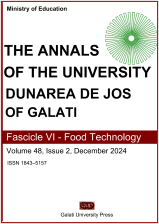Microencapsulation as an innovative technique for the preparation of high-added value bakery products – A review
Abstract
Bioactive compounds (polyphenols, carotenoids, etc.) are natural food components that provide nutritional and health benefits. Their use has increased in recent years in the food industry due to consumer concerns about the safety of synthetic ingredients. Bioactive compounds are added to food products to flavor, color, preserve and improve health benefits, but the main problem is their susceptibility to various processing and storage conditions. Microencapsulation is a useful technology that protects these compounds from degradation, increases their bioavailability, masks their undesirable characteristics and improves shelf life. Appropriate selection of encapsulation techniques and conditions, such as carriers, carrier to substrate ratio, drying temperature, feed flow rate, inlet air temperature, can affect encapsulation efficiency and final product quality. Therefore, the purpose of this review article is to collect the latest contributions and findings on microencapsulation performance and recent advances in microencapsulation processes, as well as their future prospects in the food industry.


